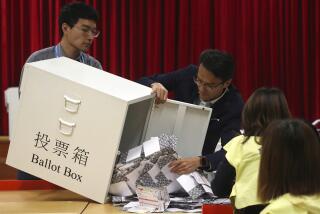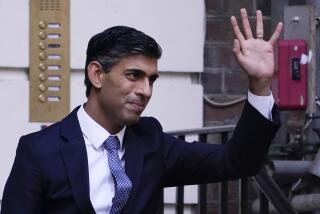Hong Kong’s Lame Duck Ruffles Feathers
- Share via
HONG KONG — The last British governor’s final policy address here was billed as the swan song of a lame duck. But in a personal and provocative speech Wednesday, Chris Patten showed that he is still willing to ruffle some feathers before handing Hong Kong over to China in 1997.
With 272 days to go until Britain gives up the land it claimed nearly a century ago in an era of imperial dominance, Patten’s address sounded more like a stump speech than an epilogue for an empire.
Patten, who will remain in office until the hand-over, attacked Beijing’s plans to replace Hong Kong’s democratically elected legislature with an appointed one and chastised business leaders for selling out Hong Kong behind closed doors.
“My anxiety is this,” he said in the wood-paneled Legislative Council chamber. “Not that this community’s autonomy would be usurped by Peking, but that it could be given away bit by bit by some people in Hong Kong. . . . If we in Hong Kong want our autonomy, then it needs to be defended and asserted by everyone here.”
But the overall tone of the 90-minute speech delivered to a polite, if drowsy, legislature was upbeat.
Patten vowed that he is far from being a lame duck leader and will govern aggressively until the Union Jack slides down the flagpole at midnight on June 30.
The 52-year-old governor, whose blond hair has turned white in his five years in office, has not had an easy time. After he introduced reforms in 1992 allowing more Hong Kong residents to participate in elections, he attracted criticism from all sides.
Furious Beijing officials said he was violating the spirit of the hand-over agreement, local business people blamed him for disrupting markets, even British diplomats condemned the governor for upsetting years of careful negotiations with China.
But the controversial reforms seem to have won the support of Hong Kong’s people--more than 1 million of the colony’s 6 million citizens voted in Hong Kong’s first fully democratic election last year. His personal approval rating is 67%.
Patten’s smooth populist style, honed by years of politicking in Britain, make him a hard act to follow for leaders schooled in the secretive Chinese tradition.
After his speech, the governor appeared on a televised panel discussion dissecting his tenure, and he plans to take live calls today on a radio talk show and hold a town hall meeting Friday.
Patten introduced 400 new policy initiatives during his speech, ranging from spending more on the elderly to expanding Hong Kong’s presence on the Internet.
His enhanced welfare programs have drawn criticism from China’s Communist leaders, who have accused him of “galloping welfarism”--an ironic charge from a country governed by the idea that wealth should be shared.
Noting that Hong Kong’s welfare system is “hardly lavish,” Patten pointed out in his speech Wednesday that the territory’s people spend more on perfume and cosmetics each year than on social programs.
In another subtle dig at China, which is trumpeting “the glorious return of Hong Kong to the motherland,” Patten reminded listeners Wednesday that Hong Kong is full of people who once fled the mainland and now prosper in a freer society.
The bustling territory, where the average person now makes more than his or her British counterparts, was built on “wave after wave of refugees who swam, walked, ran and climbed over barbed wire to find a new life in this city,” Patten said.
Among those former refugees are several local leaders positioning themselves to replace Patten.
Hong Kong’s new chief executive won’t be elected, as Patten dreamed, but will be selected by a 400-member committee vetted by Beijing. That process will occur toward the end of this year.
Four of the five front-running candidates came to Hong Kong from Shanghai’s wartime chaos but are now willing to reassert their Chinese roots.
Businessman Peter Woo is giving up his American passport for the chance to govern Hong Kong; Chief Justice T.L. Yang and publisher T.S. Lo are eschewing their British-bestowed knighthood; and Chief Secretary Anson Chan reportedly declined the title of dame, believing that an honor from the queen would do her more harm than good in the race.
More to Read
Sign up for Essential California
The most important California stories and recommendations in your inbox every morning.
You may occasionally receive promotional content from the Los Angeles Times.













